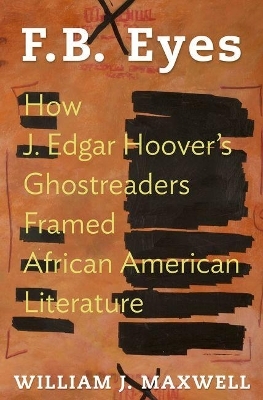
F.B. Eyes
Princeton University Press (Verlag)
978-0-691-13020-0 (ISBN)
Taking his title from Richard Wright's poem "The FB Eye Blues," Maxwell details how the FBI threatened the international travels of African American writers and prepared to jail dozens of them in times of national emergency. All the same, he shows that the Bureau's paranoid style could prompt insightful criticism from Hoover's ghostreaders and creative replies from their literary targets. For authors such as Claude McKay, James Baldwin, and Sonia Sanchez, the suspicion that government spy-critics tracked their every word inspired rewarding stylistic experiments as well as disabling self-censorship. Illuminating both the serious harms of state surveillance and the ways in which imaginative writing can withstand and exploit it, F.B. Eyes is a groundbreaking account of a long-hidden dimension of African American literature.
William J. Maxwell is professor of English and African and African American studies at Washington University in St. Louis. His F.B. Eyes Digital Archive presents copies of 51 of the FBI files discussed in this book:
Acknowledgments xi Introduction 1 The FBI against and for African American Literature 1 The Files and the FOIA 7 Five Theses and the Way Forward 15 Part One/Thesis One: The Birth of the Bureau, Coupled with the Birth of J. Edgar Hoover, Ensured the FBI's Attention to African American Literature 25 The Bureau before Hoover 29 Hoover before the Bureau 35 Bureau of Letters: Lit.-Cop Federalism, the Hoover Raids, and the Harlem Renaissance 42 Part Two/Thesis Two: The FBI's Aggressive Filing and Long Study of African American Writers Was Tightly Bound to the Agency's Successful Evolution under Hoover 59 Flatfoot Montage: The Genre of the Counterliterary FBI File 63 The Counterliterary State and the Charismatic Bureaucracy: Trimming the First Amendment, Fencing the Harlem Renaissance 68 Persons to Racial Conditions: Literary G-Men and FBI Counterliterature from the New Deal to the Second World War 76 Afro-Loyalty and Custodial Detention: Files of World War II 85 Total Literary Awareness: Files of the Cold War 94 COINTELPRO Minstrelsy: Files of Black Power 107 Part Three/Thesis Three: The FBI Is Perhaps the Most Dedicated and Influential Forgotten Critic of African American Literature 127 Reading Like a CIA Agent 131 Reading Like an FBI Agent 141 Critics behind the Bureau Curtain: Meet Robert Adger Bowen and William C. Sullivan 150 Ask Dr. Hoover: Model Citizen Criticism and the FBI's Interpretive Oracle 165 Part Four/Thesis Four: The FBI Helped to Define the Twentieth-Century Black Atlantic, Both Blocking and Forcing Its Flows 175 The State in the Nation-State; the State of the Transnational Turn 180 The State of Black Transnationalism; the State in the Black Atlantic 186 Checking Diasporan ID: Hostile Translation and the Passport Office 195 State-Sponsored Transnationalism: The Stop Notice and the Travel Bureau 205 Jazz Ambassadors versus Literary Escapees 212 Part Five/Thesis Five: Consciousness of FBI Ghostreading Fills a Deep and Characteristic Vein of African American Literature 215 Reading Ghostreading in the Harlem Renaissance: New Negro Journalists and Claude McKay 225 Invisible G-Men En Route to the Cold War: George Schuyler, Langston Hughes, and Ralph Ellison 232 Mysteries and Antifiles of Black Paris: Richard Wright, William Gardner Smith, and Chester Himes 243 Black Arts Antifiles and the "Hoover Poem": John A. Williams, James Baldwin, Sam Greenlee, Melvin Van Peebles, Ishmael Reed, Amiri Baraka, Nikki Giovanni, and Sonia Sanchez 259 Bureau Writing after Hoover: Dudley Randall, Ai, Audre Lorde, Danzy Senna, and Gloria Naylor 269 Appendix: FOIA Requests for FBI Files on African American Authors Active from 1919 to 1972 277 Notes 285 Works Cited 315 Index 343
| Erscheint lt. Verlag | 4.1.2015 |
|---|---|
| Verlagsort | New Jersey |
| Sprache | englisch |
| Maße | 152 x 235 mm |
| Gewicht | 680 g |
| Themenwelt | Geisteswissenschaften ► Geschichte ► Regional- / Ländergeschichte |
| Geisteswissenschaften ► Sprach- / Literaturwissenschaft ► Anglistik / Amerikanistik | |
| Geisteswissenschaften ► Sprach- / Literaturwissenschaft ► Literaturwissenschaft | |
| Sozialwissenschaften ► Ethnologie | |
| Sozialwissenschaften ► Soziologie | |
| ISBN-10 | 0-691-13020-5 / 0691130205 |
| ISBN-13 | 978-0-691-13020-0 / 9780691130200 |
| Zustand | Neuware |
| Haben Sie eine Frage zum Produkt? |
aus dem Bereich


